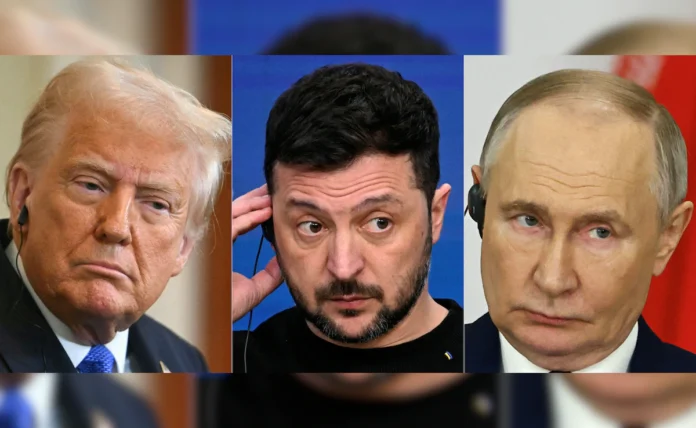German Chancellor Friedrich Merz proposed hosting a trilateral summit in Europe involving U.S. President Donald Trump, Russian President Vladimir Putin, and Ukrainian President Volodymyr Zelensky, following inconclusive talks between Trump and Putin in Alaska. This initiative, aimed at advancing peace negotiations in the ongoing Ukraine conflict, reflects Europe’s desire to ensure Ukraine’s inclusion in diplomatic efforts. The proposal comes amidst heightened geopolitical tensions, including U.S. tariffs impacting global trade and India’s push for economic self-reliance through Atmanirbhar Bharat. This article explores the context, significance, and challenges of Germany’s proposal, drawing parallels with global economic and strategic developments as of August 18, 2025.
Context of the Proposal
The trilateral summit proposal follows a series of diplomatic efforts to resolve the Ukraine-Russia conflict, now in its fourth year. On August 16, 2025, Trump met Putin at Joint Base Elmendorf-Richardson in Alaska, aiming to negotiate a ceasefire but failing to secure a breakthrough. Trump subsequently expressed interest in a trilateral meeting including Zelensky, prompting Merz to suggest Europe as a neutral venue. European leaders, including French President Emmanuel Macron, British Prime Minister Keir Starmer, and EU Commission President Ursula von der Leyen, have backed the initiative, emphasizing Ukraine’s sovereignty and security guarantees.
Merz’s proposal aligns with a broader European push to ensure Kyiv’s voice in peace talks, addressing concerns that bilateral U.S.-Russia discussions could sideline Ukraine. The German Chancellor suggested a European venue “where discussions might take place on a permanent basis,” though no specific location or date has been confirmed. This move reflects Europe’s strategic interest in stabilizing the region, especially as Russian advances in Donbas, such as near Pokrovsk, threaten Ukraine’s territorial integrity.
Significance of the Trilateral Summit
Germany’s proposal carries profound implications for global diplomacy and regional stability:
-
Inclusive Diplomacy: Including Zelensky ensures Ukraine’s agency in negotiations, countering fears of imposed territorial concessions. Zelensky has firmly rejected ceding land, calling it unconstitutional and a precursor to future Russian aggression.
-
Security Guarantees: European leaders, including Merz, stress the need for “ironclad” security guarantees for Ukraine, with U.S. participation seen as critical. Merz noted that the U.S. is ready to contribute, ensuring a collaborative approach with Europe.
-
Peace Over Ceasefire: Trump’s shift from advocating a ceasefire to pursuing a comprehensive peace agreement aligns with European priorities for a lasting resolution, potentially reducing the risk of renewed conflict.
-
European Leadership: Hosting the summit in Europe underscores the EU’s role in global diplomacy, reinforcing its commitment to Ukraine’s NATO and EU aspirations, which Russia cannot veto.
The proposal resonates with India’s Atmanirbhar Bharat initiative, as both reflect a push for strategic autonomy. India’s response to U.S. tariffs, threatening $87 billion in exports, mirrors Europe’s efforts to assert influence amidst geopolitical pressures.
Challenges to the Summit
Several obstacles could hinder the trilateral summit’s success:
-
Putin’s ICC Warrant: An International Criminal Court (ICC) arrest warrant against Putin for war crimes complicates his travel to Europe, as most EU countries are ICC signatories. Hungary, under Viktor Orban, is withdrawing from the ICC’s founding treaty, making it a potential venue, but this raises diplomatic complexities.
-
Russian Demands: Russia insists on territorial concessions and guarantees for Russian language and churches in Ukraine, demands Zelensky has rejected. Recent Russian bombardments, condemned by Merz as “disrespectful,” signal Moscow’s reluctance for peace.
-
Geopolitical Tensions: U.S. tariffs and global trade disruptions, akin to those affecting Shandong’s steel industry, could strain transatlantic cooperation, impacting summit dynamics.
-
Logistical Uncertainty: Merz noted that the date and location are still pending, with details to be clarified in the coming weeks, potentially delaying progress.
Opportunities for Progress
Despite challenges, the summit offers significant opportunities:
-
Diplomatic Momentum: Zelensky’s visit to Washington on August 18, 2025, to meet Trump, followed by European leaders’ participation, could set the stage for concrete negotiations.
-
European Unity: The joint statement by Merz and other leaders strengthens EU-NATO coordination, enhancing leverage in talks with Russia.
-
Global Relevance: A successful summit could position Europe as a diplomatic hub, mirroring India’s efforts to diversify trade through FTAs with the UK and UAE to counter U.S. tariffs.
-
Tech Synergies: India’s mining-tech rush, spurred by Jabalpur’s gold discovery, highlights the role of innovation in strategic sectors. Similarly, diplomatic tech tools, like secure virtual platforms, could facilitate summit preparations.
Germany’s proposal for a Trump-Putin-Zelensky trilateral summit in Europe, announced on August 17, 2025, represents a pivotal step toward resolving the Ukraine conflict. By advocating for an inclusive, European-hosted dialogue, Chancellor Friedrich Merz underscores the importance of Ukraine’s sovereignty and long-term security guarantees. Despite challenges, including Putin’s ICC warrant and Russian territorial demands, the summit offers a chance to forge a lasting peace agreement, supported by unified European and U.S. efforts. As India navigates its own economic challenges with initiatives like Atmanirbhar Bharat, the proposed summit reflects a global push for strategic autonomy and stability. On the eve of India’s 79th Independence Day, this diplomatic endeavor highlights the interconnectedness of global peace and economic resilience, positioning Europe and India as key players in a complex geopolitical landscape.



